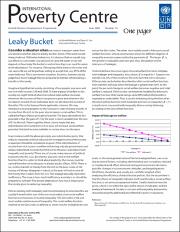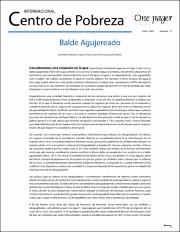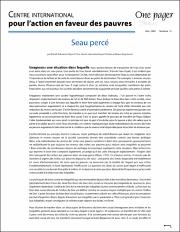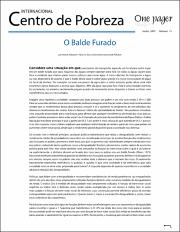Please use this identifier to cite or link to this item:
https://repositorio.ipea.gov.br/handle/11058/15472Files in This Item:
| File | Description | Size | Format | |
|---|---|---|---|---|
| en_IPCOnePager15.pdf | 40.33 kB | Adobe PDF |  View/Open | |
| es_IPCOnePager15.pdf | 104.04 kB | Adobe PDF |  View/Open | |
| fr_IPCOnePager15.pdf | 103.96 kB | Adobe PDF |  View/Open | |
| pt-br_IPCOnePager15.pdf | 104.67 kB | Adobe PDF |  View/Open |
| Title: | Leaky Bucket |
| Other Titles: | Balde Agujereado Seau percé O Balde Furado |
| Authors: | Kakwani, Nanak Son, Hyun H. |
| Abstract: | Consider a situation when we need to transport water from one place to another place in a leaky bucket. Some of the water would always leak out. If all water leaked out, it is obvious that we would stop our efforts to carry water. Our decision to carry the water or not will depend on how leaky the bucket is and on how big is our need for water at the destination. For instance, if bringing a little water to the other end can save a life we will be perhaps willing to accept that, say, 99 % of the water leaks out. This is an extreme situation. Societies, however, tacitly judge how much leakage they are prepared to tolerate while making a transfer to the needy. (...) Considere uma situação em que precisemos de transportar água de um local para outro lugar |
| metadata.dc.rights.holder: | International Policy Centre for Inclusive Growth United Nations Development Programme |
| metadata.dc.rights.license: | O texto e dados desta publicação podem ser reproduzidos desde que as fontes sejam citadas. Reproduções com fins comerciais são proibidas. |
| metadata.dc.type: | One Pager |
| Appears in Collections: | Publicações do IPC-IG |
Items in DSpace are protected by copyright, with all rights reserved, unless otherwise indicated.

